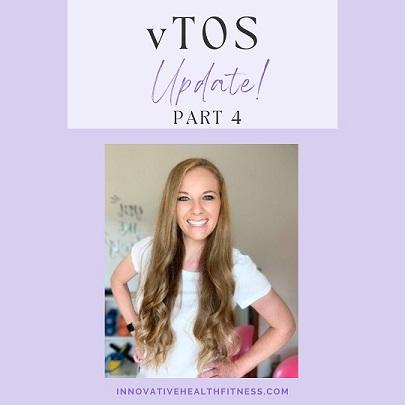
vTOS Surgery Update Part 4
My Journey with Venous Thoracic Outlet Syndrom part 4!
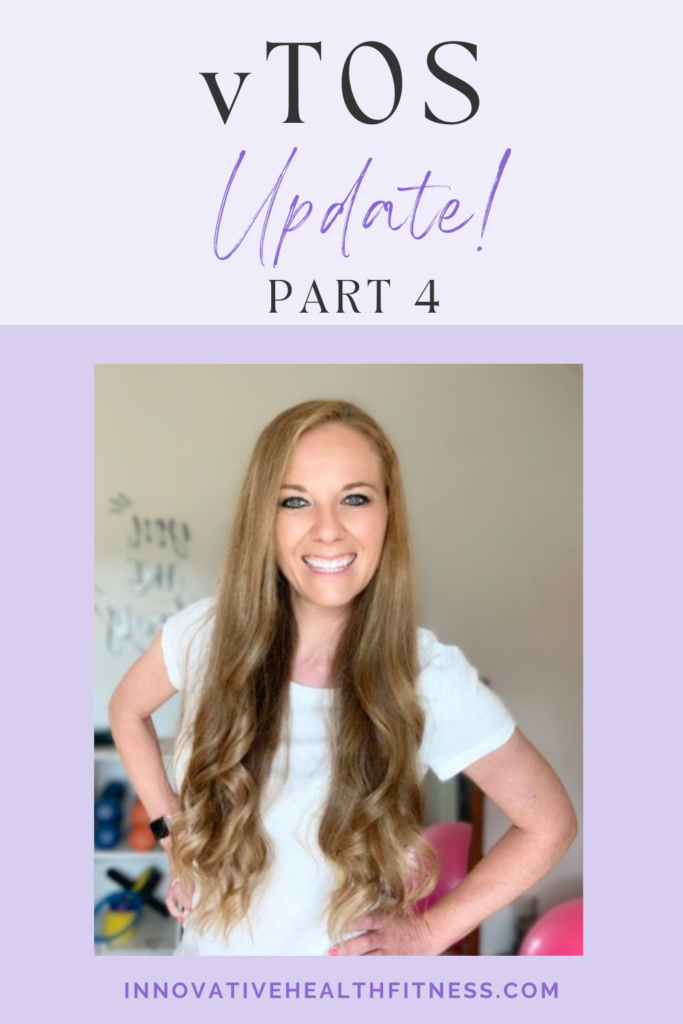
This journey has been more challenging than I thought it would be and as I’m writing this update which is way overdue I am getting ready for another surgery. It’s actually really hard for me to write because I feel like it’s such a negative situation and I don’t like to focus on the negative but I want to get my story out there to hopefully help others out there in a similar situation.
If you have missed my other updates you can check them out here:
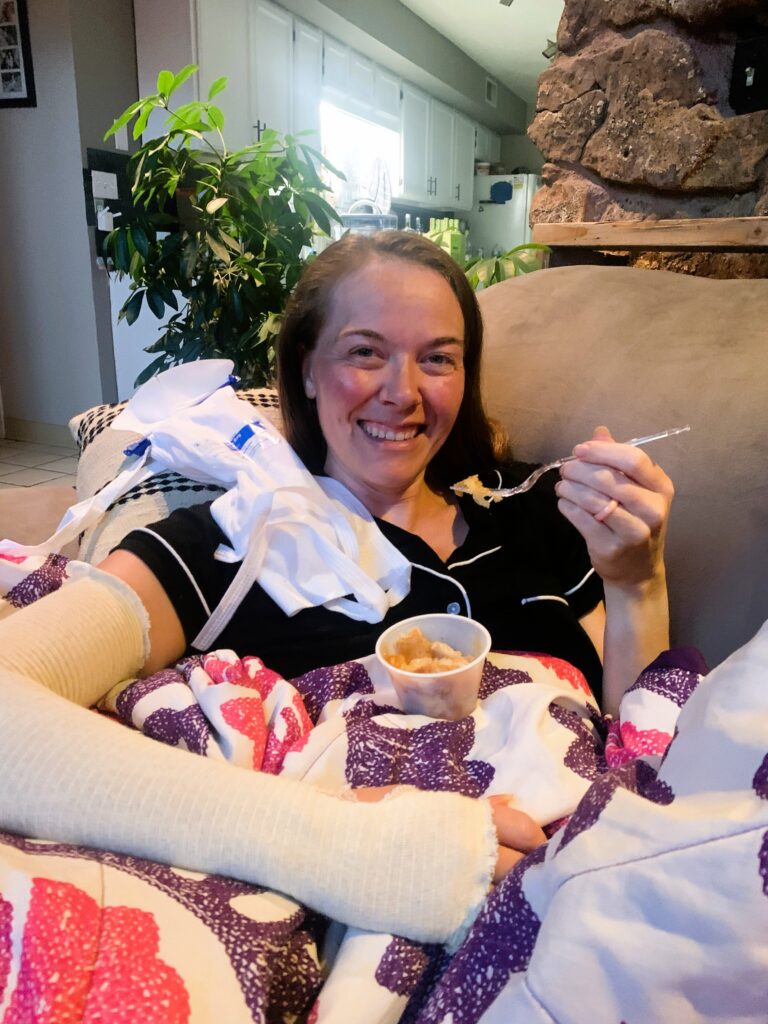
To say this vTOS journey is challenging is an understatement. So much has happened since my last blog about this that it’s hard to know exactly where to start. So I will just touch on a few main events.
A week after my surgery, I went in to get my drain removed. I could not wait for this since it was causing a lot of pain. Later I find out it wasn’t the drain that was hurting me. But more on that later. At this visit, I just met with the PA and not my surgeon.
My incision started to bleed from both ends. I called the nurse line to see if this was normal. They had said it wasn’t and had me come in early for my post-op with my surgeon. I had developed a hematoma on my incision site. He had to “milk the blood out”.
Once I was three weeks post-op I started Physical Therapy which I was very excited about. Hoping this would help me get back to my normal active self.
I was continuing to recover slowly and trying to take walks outside as much as I could doing my physical therapy exercises. Two months went by and my arm was still turning purple, feeling numb and in a lot of pain.
I had a follow-up ultrasound where I found out I had developed blood clots in my arm in a couple of different places.
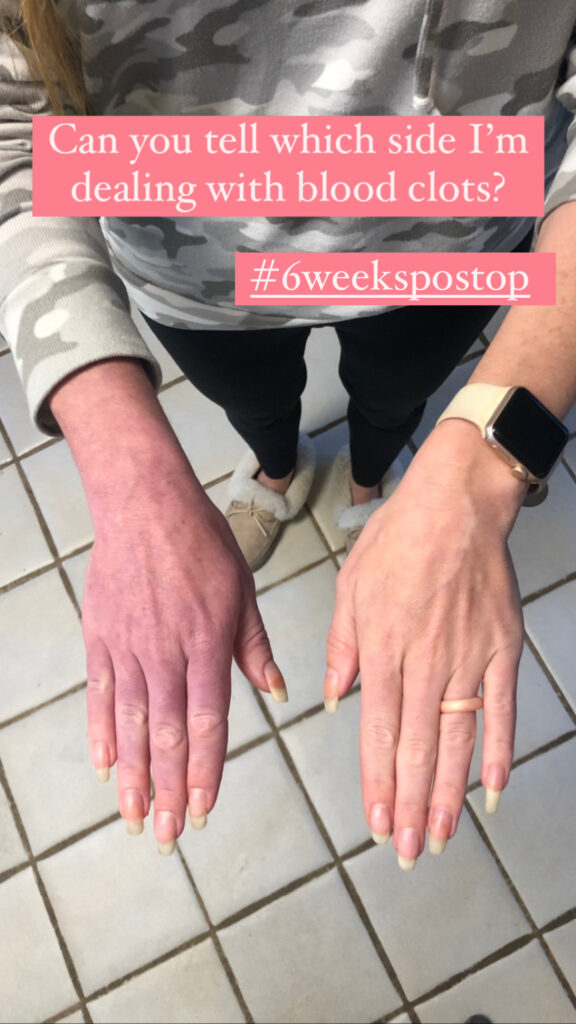
My surgeon put me back on blood thinners and we scheduled another surgery to remove the blood clots. We were very hopeful that this would finally heal my arm and shoulder.
Spoiler it doesn’t!
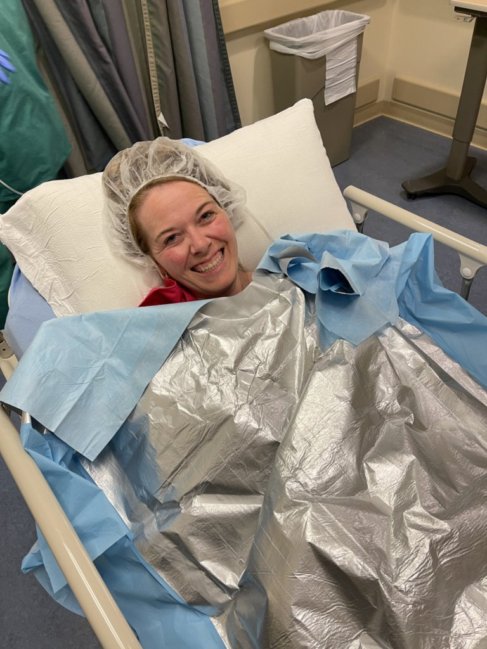
I had my three week post-op appointment with my surgeon. At this time I still wasn’t showing any improvement.
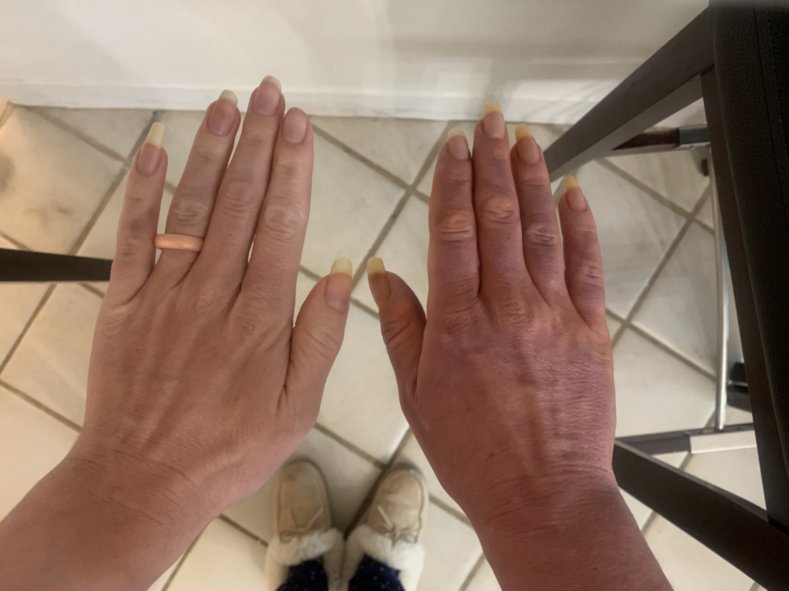
He suggested I wear a compression arm sleeve to help with the swelling and to come back in two months.
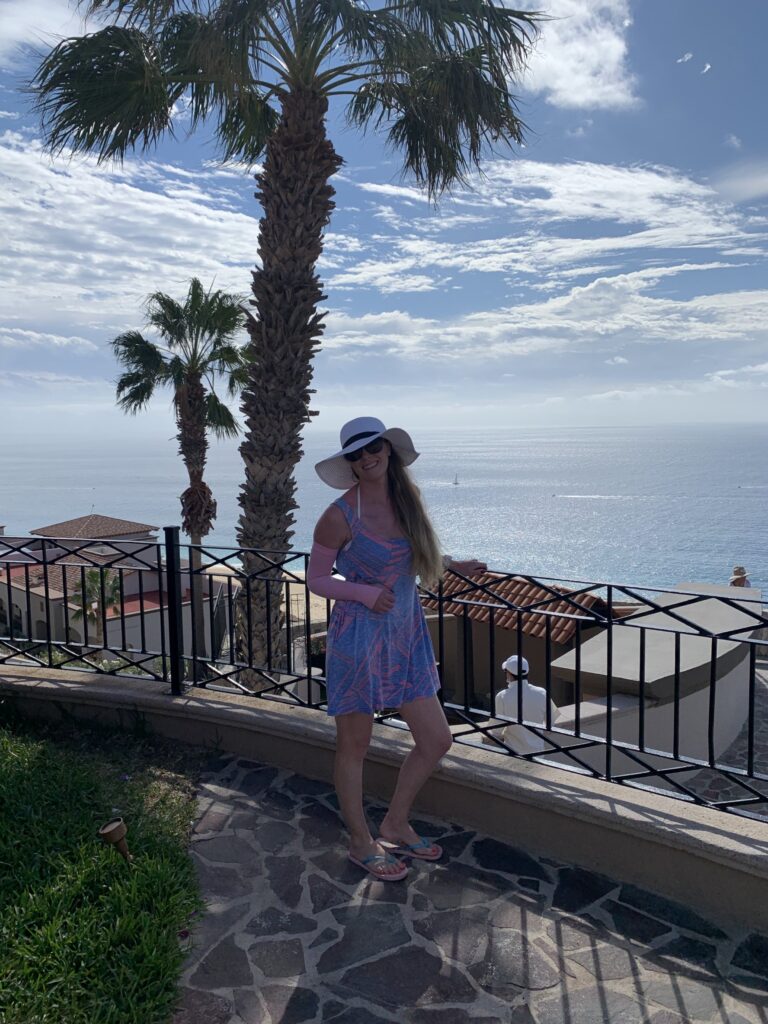
At my two-month post-op follow I was doing the same no real improvement. My doctor told me that he had done everything he could do for me and suggested I get a second and third opinion.
He referred me to two different doctors.
I scheduled appointments with both doctors. Since nothing has been working I didn’t want to rush into anything.
The first doctor thought I had scar tissue inside my vein and ordered a CT Scan and another ultrasound. We were not impressed with this appointment.
The next vascular surgeon I saw we were very impressed. Everything about my first appointment was totally geared towards what was going on with my arm. Questions like can you open a jar, can you carry groceries bags….. He had me score everything on a scale of 0-5 and I scored a 75! He said his score was zero and Ryan’s score was zero so mine was very high. He tested the strength in both of my hands. And measured my biceps to compare. My right side is 3cm larger than my left arm. He wanted an ultrasound to see the compression of my vein. They have an in house ultrasound and squeezed me in during my appointment.
He believes that I have muscle damage, nerve damage as well as vein compression. Remember earlier I said my drain location was hurting me. I told him about this pain he said it is my pec minor muscle that is causing the pain and compression. My neck and shoulder have been in a lot of pain and that is due to my scalene muscle. He also thought that I might have nTOS (nerve thoracic outlet syndrome)
He had me get an X-ray and had me see a Neurologist to test my nerves. Once I had the EMG (Nerve test) my new doctor wanted to go over the results and do a muscle block. Since both these appointments were in Denver he had me schedule the test for that morning and to see him that afternoon.
I had no idea what to expect during the EMG test.
Electromyography (EMG) measures muscle response or electrical activity in response to a nerve’s stimulation of the muscle. The test is used to help detect neuromuscular abnormalities. During the test, one or more small needles (also called electrodes) are inserted through the skin into the muscle. -John Hopkins Medicine
This test was pretty painful and I really didn’t feel well the rest of the day. And was super sore the next few days. The nurse started with small shocks in different areas of my arm starting with my right arm and then moving to my left to compare. She put stickers all over my arm and then placed small jumper cables like tools on the stickers. It was such a weird feeling. With each shock, she would up the voltage and my arm would jerk. After the nurse was done with her test the Neurologist came in and did an exam and then he performed the big nerve test. Sticking a large needle into my hand, and bicep but the most painful test was when he stuck the needle into my spine starting on my right side and then shocking me. He then did the same thing on my left side. My whole body jumped. It was just so crazy and painful! So glad to have that done with!
Ryan and I stopped for lunch in between my appointments. Which was great but I was drained.
That afternoon I met with my new doctor and he performed several tests to get a baseline before the muscle block. He started with my pec minor muscle. He injected the block while looking at the ultrasound machine. I had to rest for 10 minutes then he came back in and redid the tests to see if I had improved which I did! Yay! He injected another round of muscle block but this time in my scalene muscle, again I had to rest for 10 minutes and then perform the test again. Once again I had improved. Which confirmed I have muscle damage.
Brachial plexus block: Local anesthetic is injected into the scalene muscles of the neck. The chance of having neurogenic TOS is stronger if other symptoms disappear while this area is numb.
Pectoral nerve (Pecs) block I and II are a novel technique to block the pectoral nerves, intercostal nerves 3 to 6, intercostobrachial nerves and the long thoracic nerve.
What’s next?
The plan is to have another major surgery. Basically, a redo surgery to fix the damage from my previous surgeon.
He will remove the remaining first rib, remove scar tissue from my vein, dissect the nerves that are being compressed, and do a pec minor release and a scalene release. He will go in through my armpit and make a small incision at the base of my neck. He thinks I should be in the hospital for 2-4 days. Now we just wait until we can get this surgery scheduled. That has been a bit challenging. I will update you as soon as I know when I will be having this next big surgery.
Wow! That was a lot to explain. Thank you for making it all the way to the end of this blog! Even though it’s hard to write about these events I’m happy to share my story with vTOS! Even though this whole situation has been challenging I’m not letting it bring me down! I’ve decided since my arm hurts no matter if I’m active or not to just power through the pain and start doing things I enjoy. If you have been following me on Instagram you will know that we have been remodeling our home and I have been helping. I started gardening and painting again and things like that. I have even done a few DIY projects.
On a positive note, my arm coloring has been better and I believe in the last few weeks I have developed new feeder veins that is helping with my blood flow! Which is great!
Here is a fun Reel I posted with a recap of 2021! enjoy!
Do you know someone with TOS? I would love to know about your experience!
Have a great day!

Related posts:
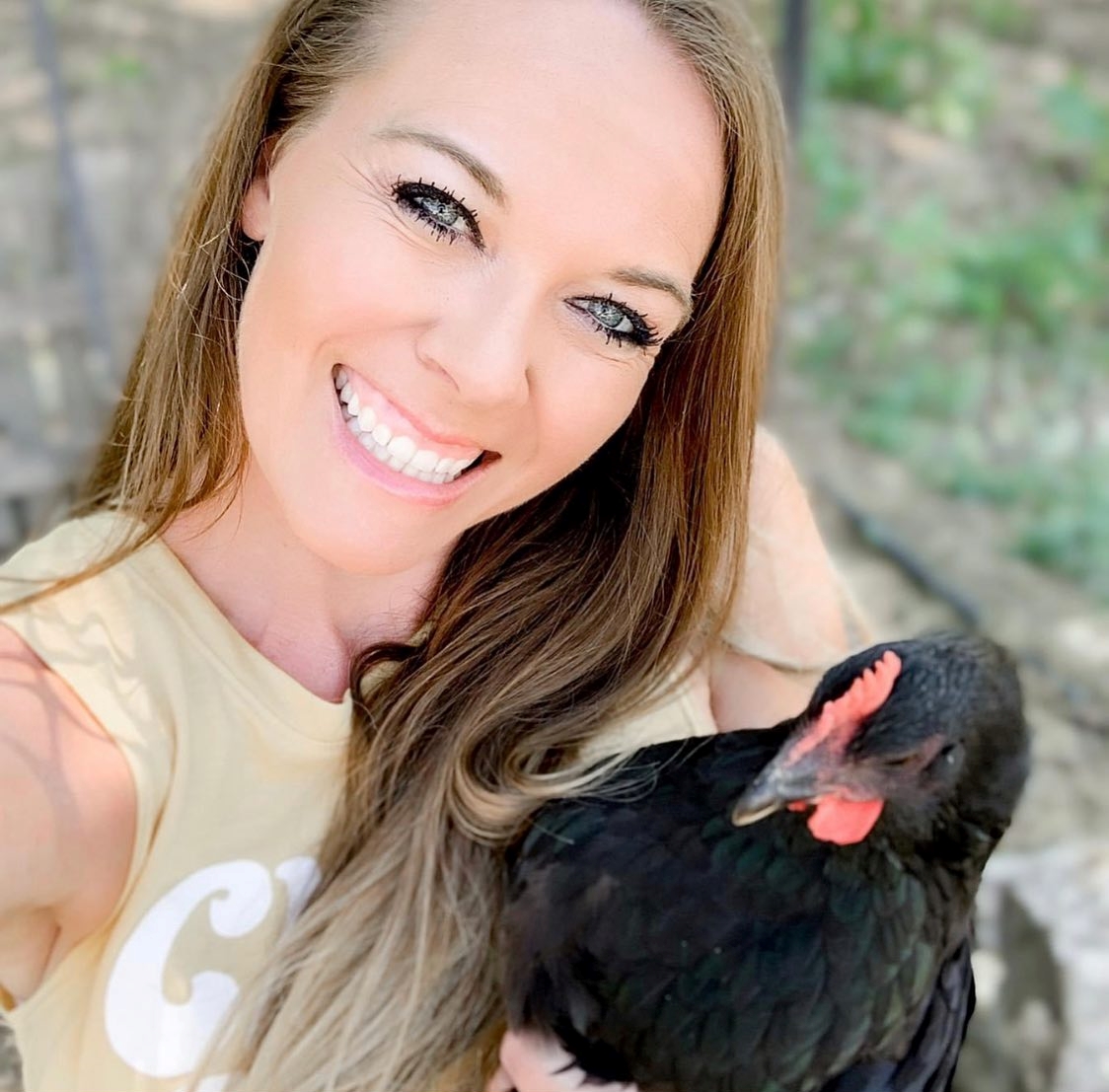
Hi!! I’m Kristin McConnell, I am so glad you are here! I am a wife to my amazing husband and a Mom of two fabulous kids. I love gardening, raising chickens, bee keeping and baking sourdough bread!
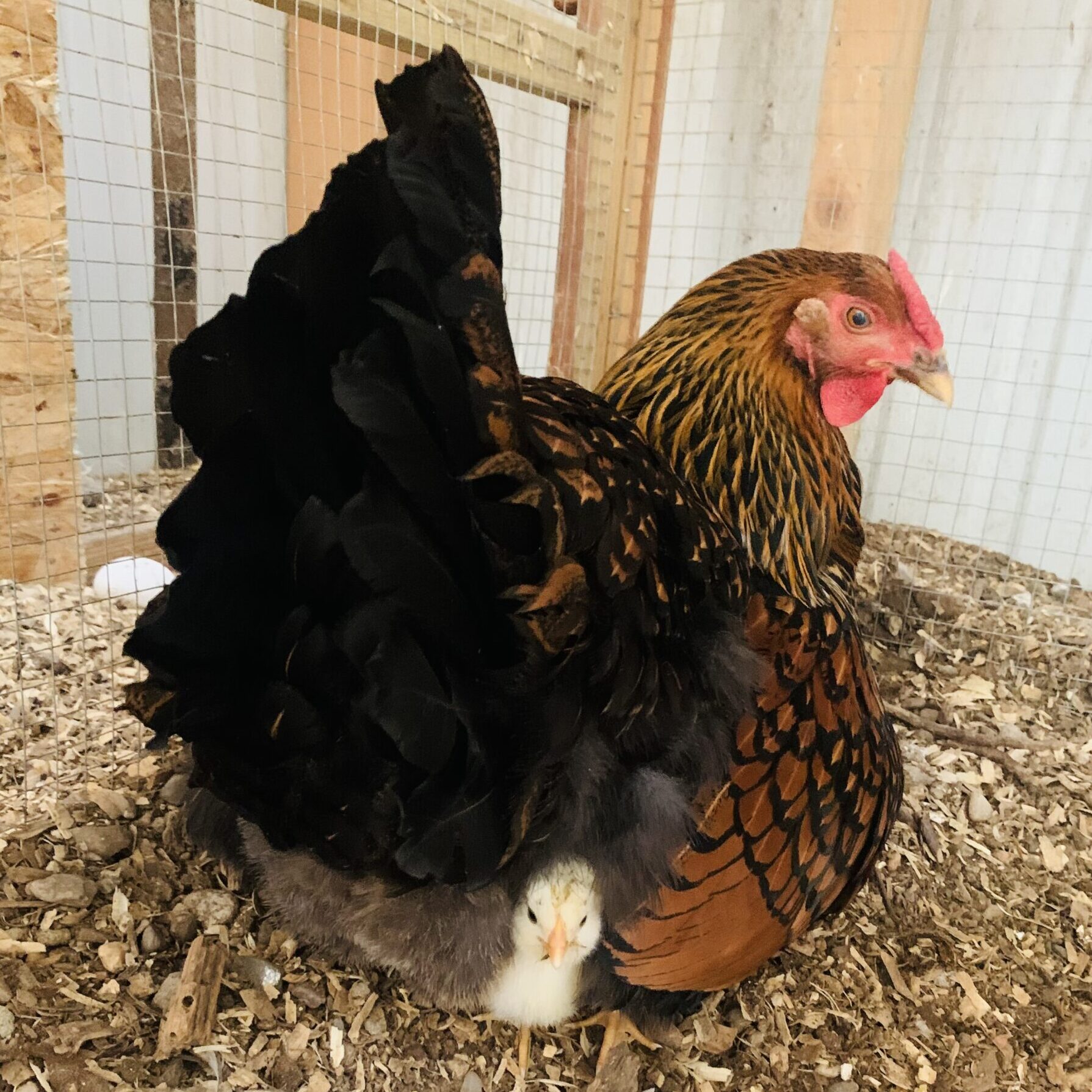

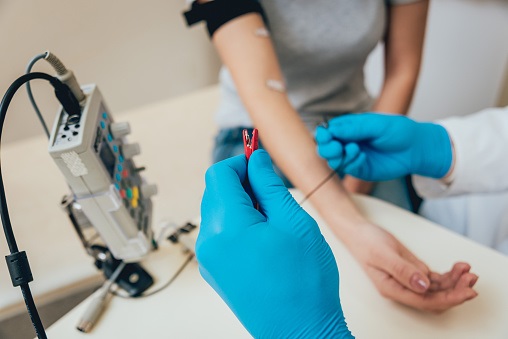
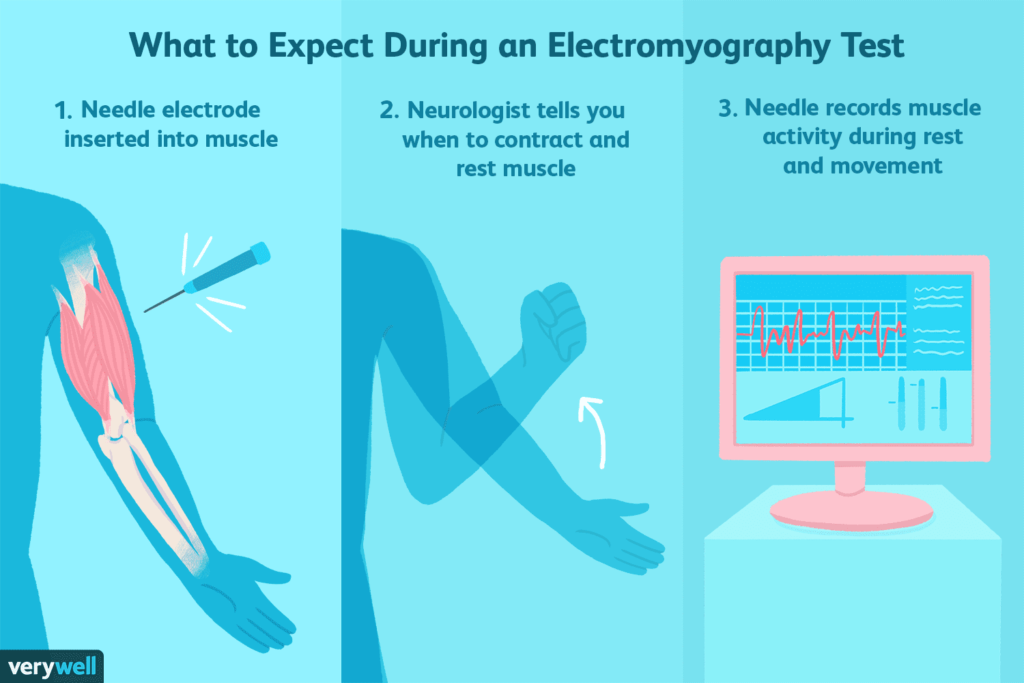
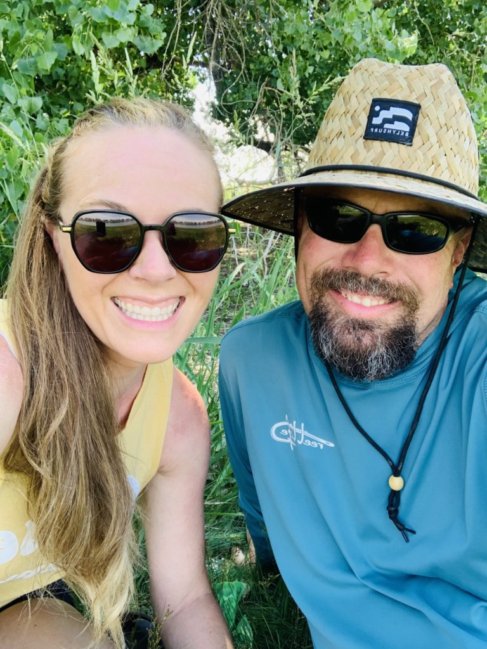




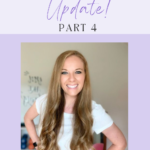
Hi, I just found out I have vtos though my arm is not blue, I don’t get numbness and I haven’t had clots yet, my arm flares up into excruciating pain that’s in my shoulder blade, neck, traps, shoulder, arm, elbow & wrist. I only get about a week each month where I’m not on an anti inflammatory & pain is gone. I love working out and haven’t been able to for 6 months.
My questions for you are:
Who was the final doctor who helped you the best?
What were your EMG results?
Did you have any signs of vtos before your blood clot & color changes?
What would you have done differently throughout your process?
I’ve had this for 6 months now and have not yet seen a vascular surgeon. I do have appointments with them in the next month but I’ve only seen neurosurgeons and spine specialists because they thought my cervical discs were the problem but they are not. Anyway, I look forward to your response!